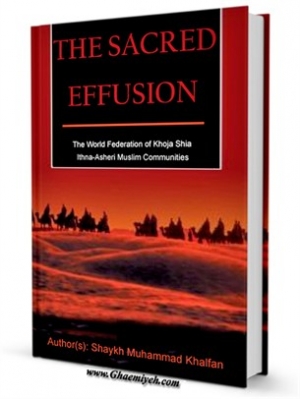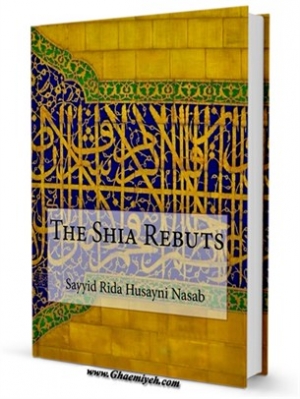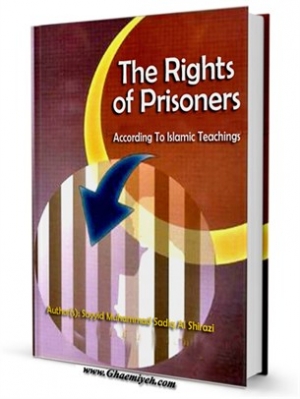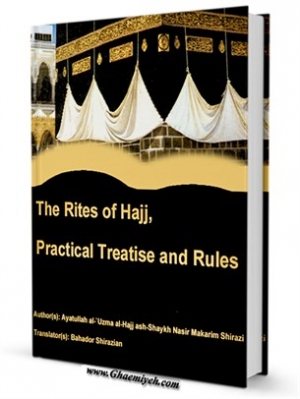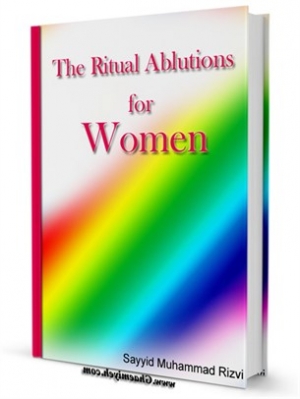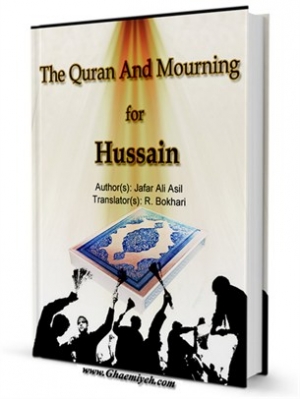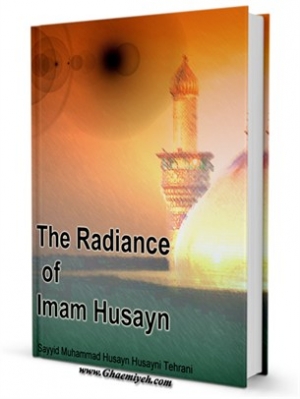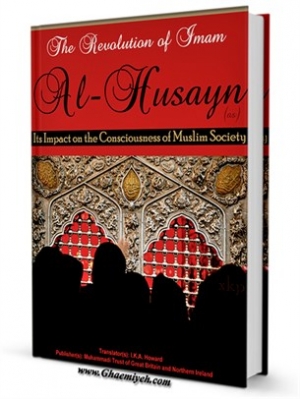Super User
The author of this book is Shaykh Muhammad Khalfan. It is published by "The World Federation of Khoja Shia Ithna-Asheri Muslim Communities".
This is an age where the very purpose of our existence has been obscured by the glut of materialism. We seem to be engulfed in a quagmire that deflects our energy away from his divinely intended purpose. Our true fulfillment can only come through inner light, when the heart is awakened to seek its divinely intended purpose.
This seminal work on Ziyarat ‘Ashura, aptly named The Sacred Effusion, by Shaykh Muhammad Khalfan, is a beacon for the seeker to seek the Sacred and the Divine. With his characteristic insight, the venerable Shaykh guides us to understand how Ziyarat ‘Ashura can be a potent antidote to reawaken our hearts to the real purpose of our existence and not remain a mere habitual or ritual recitation.
As one reads the words so passionately penned by the author, one cannot help but visualize and ponder upon the origin of the very word Ziyarat, which originates from the word zawr, which means to deflect or turn away. The context becomes all the more evident when we read that the Arabic word zur refers to a lie - because it deflects from the path of truth. This sets the scene for the reader to contextualize the very essence of the spiritual and moral aspects of the Ziyarat - that when visiting the shrines of the Ma’sumin, or reciting the Ziyarat we momentarily ‘turn away’ from our worldly existence and gravitate towards an inner state of seeking none other than Allah. The essence of the Ziyarat, as elucidated by the author is that the zair who recites the Ziyarat must imbibe the spirit and attain the cognizance of the sublimity of Ziyarat ‘Ashura to enable him to align himself with the spirit of the visited one.
The author eloquently elucidates that the crux of the Ziyarat ‘Ashura are the concepts of al-Tawalli and al-Tabarri. He writes:
Besides its ample merits, it is a program of revolution for the sleeping masses. The crux of the Ziyarat is al-tabarri` and al-tawalli, which can correctly be translated as ‘fleeing from imperfection’ and ‘seeking perfection’, or in beautiful words of every Muslim: La ilahaillallah - Besides Allah - the Only Beloved, there is no other ilah (beloved).
The name Allah exemplifies all the perfect attributes of the Divine Essence, which the human being has been molded to appreciate and naturally seek. The Holy Qur`an says:
‘...the innate nature of Allah, upon which the human beings were molded.’ (30:30).
Therefore the Ziyarat in reality is a call to the unsullied innate disposition (fitra) of the human being.
The oft-repeated salutation of Assalamu ‘Alayka Ya Aba ‘Abdillah, assumes an everlasting impression upon our minds when we read how we must manifest our intentions to unite with his lofty ideals, and in cursing his opponents how we must demonstrate our revulsion at the worldly desires of his enemies. If we truly make that salutation with that understanding, it helps us align ourselves with the spirit of Imam al-Husayn (AS) and we have fulfilled and are true to the words we recite in the Ziyarat:
So I ask Allah, who ennobled me by knowing you and knowing your friends, and enabled me to seek remoteness from your enemies, to place me in your company in this world and the Hereafter.
This allows us to seek nearness to Allah through the Ziyarat rather than to be only motivated to gain personal benefits. Unquestionably, many traditions of the A`imma promise us that by the recitation of Ziyarat ‘Ashura our needs would be fulfilled. For example Imam Ja’far as-Sadiq (AS) guided Safwan thus:
When you are confronted with some adversity, then seek redress of your grievances from Imam al-Husayn (AS) with this Ziyarat and Allah never reneges on His word.
However, the real question that we are encouraged to ponder upon is “What is our real need that we should ask for?” It helps us create an awareness of our own selves so that we can assess the true value of our neediness. Cited is an inspiring example of asking for one’s real need is of Shaykh ‘Abd al-Karim Hairi, the founder of the Hawza of Qum. It is said that during the Ziyarat at the Haram of Imam al-Husayn (A) he was seen weeping and telling the Imam (AS): “O dear master, I have become a mujtahid but I want to become a human being.”
Thus the Ziyarat, must go beyond the seeking of mundane material benefits and rise to the lofty sublimities of cognition and self-awareness to awaken us from the sluggishness caused by the excesses of hubbe-duniya. To do so is to realize the ultimate purpose of Ziyarat. After all who can be a better symbol than Imam al-Husayn (AS) whose supreme sacrifice on the day of ‘Ashura, symbolized the highest manifestation of Tawheed - that Besides Allah- the Only Beloved, there is no other ilah (beloved).
This book is authored by Sayyid Rida Husayni Nasab. Its translator is Mansoor Limba. It is published by Ahlul Bayt World Assembly.
Those who are aware of the circumstances prevailing in the Muslim world know well that nowadays the Muslim ummah has become “ummahs” and every “ummah” has its own way and customs and the life of its subjects has fallen into the grasp of individuals who regard their hegemony and survival as depending on kindling flame of differences.
Consequently, these individuals have made investment in various forms and are able to make use of every possible means.
This situation has left no room for dialogue among the Islamic sects and there has been a lot of dispute over many questions. Most of these questions are scholastic {masa’il-e kalami} originated by Muslim scholastic theologians {mutakallimun} and many Muslims are unaware of those differences.
However, there are common axes which form a good ground for unity among them. In fact, the common points of the various Muslim sects are more than the points of difference; yet, the sponsors of discord have dwelt on those differences and so they mention nothing but the common issues related to the roots and branches of religion.
In one of the conferences on “Proximity among the Islamic Schools of Thought”, I was assigned to expound on the topic, “The Schools of Jurisprudence Regarding Personal Statuses” (marriage, divorce, inheritance, etc.).
I presented to the conference the writer’s paper which surprised the Sunni participants. Prior to reading the paper, they rejected the idea that in most issues pertaining to these three questions the Shi‘ah jurisprudence has identical view with that of the present four Sunni schools of thought.
From a distance a grudge is nursed and the Shi‘ah is regarded as apart from the Muslim sects. Day and night they speak in the mass media against this group which has been wronged by history. This act can only render service to the common enemy.
This unwary group is invited to lift the veils of ignorance from their views and establish better ties with the Shi‘ah, strengthen their connection with their ‘ulama’ and scholars, and recognize the Shi‘ah as their own brothers—an aim which the Shi‘ah has for centuries been looking for, and thus, realizing the purport of the verse that follows:
إِنَّ هَٰذِهِ أُمَّتُکُمْ أُمَّهً وَاحِدَهً وَأَنَا رَبُّکُمْ فَاعْبُدُونِ
“Indeed this community of yours is one community, and I am your Lord. So worship Me.”
One of the old plots hatched by imperialism in the Muslim nations is to create skepticisms and to intensify problems and then to strike a blow for the glorious Islamic Revolution, and various forms of this old method was common in the Middle East and other regions in recent centuries.
On meeting Iranian pilgrims during the Hajj season, many pilgrims who have familiarity with the Islamic Revolution and whose minds are poisoned with the enemy’s sinister propaganda, ask questions and want to know the answers.
In response to this demand, the eminent and honorable scholar, Sayyid Rida Husayni Nasab, compiled the answers (to those questions) under my supervision and according to the permission given to him, he was to observe brevity in answering the questions and to put detailed explanations to a later time.
It is hoped that this little service would be accepted by the Imam of the Time (may our souls be his ransom).
This book is authored by Sayyid Muhammad Sadiq Al Shirazi. It is published by CreateSpace Independent Publishing Platform in 18 Mar. 2014.
The author argues the issues of imprisonment and related matters, and discusses in some details the disadvantages of imprisonments and its harmful effects, and therefore the need to reduce the number of prisoners to a minimum, and eventually to eliminate prisons altogether.
As a complete system of teaching for life, Islam addresses every aspect of life to guide mankind to the best possible solution in every respect. Islam addresses issues of concern for this life and beyond.
Although the teachings of Islam are devised to prepare mankind for the eternal life of the hereafter, it does not neglect man's need for guidance during the brief cycle of life in this world. Islam presents detailed teachings or general guidance for man that is in harmony with his nature, at various stages of his life, and for every situation that he comes across.
On the issue of prison and a prisoner's right therefore, Islam has its own philosophy with regard to the question of imprisonment and the prison system. In general, Islam considers imprisonment as a case of last resort, and in many circumstances imprisonment is not used as a punishment. However, there
are a number of offences for which imprisonment has been prescribed.
Any chastisement prescribed by Islamic teachings may only be implemented if all the criteria and preconditions prescribed by those teachings are also met. If any of the criteria is not met, then the prescribed punishment may not be executed. In that condition a judge would consider a lesser punishment to reprimand the offender, as seen fit.
For example, the prescribed punishment for theft could ultimately be amputation of parts of the fingers. However, the author, the most eminent authority on Islam in recent times, cites more than forty conditions, all of which must be met simultaneously, if this punishment were to be carried out; a requirement that is practically almost impossible to meet today.
One of these criteria is that a true Islamic system of government has been implemented in all aspects of life and society, politics and economics, etc. Failing that, Islamic teachings indicate, the prescribed punishment may never be carried out, and a lesser deterrent, if at all, may be considered. Today therefore, when none of the Muslim countries around the world has implemented a true Islamic system of government, this punishment, or any other punishment prescribed by Islam, may not be executed for such reasons as the above-mentioned.
On the issue of imprisonment and related matters, in the first chapter of this book the author addresses the fundamental nature of freedom, and henceforth highlights the harmful effects of imprisonment on the individual concerned, and consequently on the community asare a number of offences for which imprisonment has been prescribed.
Any chastisement prescribed by Islamic teachings may only be implemented if all the criteria and preconditions prescribed by those teachings are also met. If any of the criteria is not met, then the prescribed punishment may not be executed. In that condition a judge would consider a lesser punishment to reprimand the offender, as seen fit.
For example, the prescribed punishment for theft could ultimately be amputation of parts of the fingers. However, the author, the most eminent authority on Islam in recent times, cites more than forty conditions, all of which must be met simultaneously, if this punishment were to be carried out; a requirement that is practically almost impossible to meet today.
One of these criteria is that a true Islamic system of government has been implemented in all aspects of life and society, politics and economics, etc. Failing that, Islamic teachings indicate, the prescribed punishment may never be carried out, and a lesser deterrent, if at all, may be considered. Today therefore, when none of the Muslim countries around the world has implemented a true Islamic system of government, this punishment, or any other punishment prescribed by Islam, may not be executed for such reasons as the above-mentioned.
On the issue of imprisonment and related matters, in the first chapter of this book the author addresses the fundamental nature of freedom, and henceforth highlights the harmful effects of imprisonment on the individual concerned, and consequently on the community as a whole.
The rights of prisoners according to Islamic teachings The author then goes on to discuss in some details the disadvantages of imprisonments and its harmful effects, and therefore the need to reduce the number of prisoners to a minimum, and eventually to eliminate prisons altogether.
In this chapter the author also outlines some of the offences that would lead to imprisonment under an Islamic system, and cites cases to demonstrate the attitude and role the Islamic ruler should have towards offence; that is to try to identify issues, or circumstances that would allow him to waive the punishments in any particular case.
In the second chapter, the author addresses the issue of torture in general, and the mental and physical ill treatment that a prisoner is subjected to while in detention under the pretext of interrogation and extracting confession from a detainee or a suspect.
Not only such a confession is totally invalid in an Islamic court of law, but the author decrees that even a wilful confession to be invalid if that confession is made while in detention.
In the third chapter, the author discusses in some detail, the issue of the Islamic penal code, its categories, and in particular the pre-conditions and the criteria that must be met, before any Islamic punishment may be executed in accordance with the Shari'ah.
In the fourth chapter of the book, the author addresses the issue of the rights of a prisoner, and his freedom to engage in various activities ranging from commercial activities to intellectual projects. In the final chapter of this work, a number of Fatwa or Islamic rulings are included concerning imprisonment, detention, torture, and the validity of a confession of a suspect.
This work would be of particular interest to those who are associated or involved with prisoners and prisons in general. Human rights activists would also find this work of particular interest.
The author of the book is Ayatullah Murtadha Mutahhari. It is published in W.O.F.I.S. World Organization for Islamic Services. The author outlines general rights of women with special emphasis to marriage. Some of the areas covered are marriage proposal, engagement, temporary marriage, modernity, dowry, inheritance, divorce and polygyny.
The problem of family relations in our age is not so simple and trivial as may be resolved by filling up questionnaires by boys and girls by holding seminars — like the seminars I saw and heard of, and the level and standard of intellect that was displayed in them, which is not peculiar to our country. Other nations have also not been able to find a solution to the problem, nor do they claim to have found one.
The philosopher Will Durant, the well-known writer of The Story of Civilization, writes: “If in imagination we place ourselves at the year 2,000, and ask what was the outstanding feature of human events in the first quarter of the twentieth century, we shall perceive that it was not the Great War, nor the Russian Revolution, but the change in the status of woman. History has seldom seen so startling a transformation in so short a time.
The ‘sacred home’ that was the basis of our social order, the marriage system that was our barrier against human passion and instability, the complex moral code that lifted us from brutality to civilization and courtesy, are visibly caught in that turbulent transition which has come upon all our institutions, all our nodes of life and thought.” (The Pleasures of Philosophy New York, 1953, p.l29)
Today, similarly, when we are living in the last quarter of the twentieth century, the lamentations of western thinkers are all the more articulate when they witness around them the break up of family ties, the weakening of the foundations of marriage the evasion of young people in accepting the responsibilities of marriage, the dislike of being a mother, the dwindling of paternal and maternal affections, indulgence in the satisfaction of temporary passions instead of love, the ever-increasing incidence of divorce, the galloping increase in the number of illegitimate child with unity and sincerity being very rare thing in married couples.
This book is written by Ayatullah al-`Uzma al-Hajj ash-Shaykh Nasir Makarim Shirazi and translated into English by Bahador Shirazian.
This book discusses the important of Hajj, one of the obligatory pillars in Islam. The secrets, conditions of necessity, different types of Hajj as well as conditions of Hajj al-Tamattu' are thoroughly discussed along with its rules and regulations.
Hajj is one of most important pillars of Islam and it is one of greatest religious duties.
Holy Qur’an says in a short and meaningful sentence:
وَ لِلّه عَلَی النّاسِ حِجُّ الْبَیْتِ مَنِ اسْتَطاعَ اِلَیْهِ سَبیلاً.
It is on people for the sake of Allah to perform Hajj of his house, anyone who is able to undertake the journey to him. (2:196)
And it says below this verse:
وَ مَنْ کَفَرَ فَاِنَّ اللّهَ غَنِیٌّ عَنِ الْعالَمینَ
And anyone who disbelieves (and renounces Hajj, has impaired himself), Allah is not in need of any of his created ones in the worlds.”(3:97)
The sentence “It is on people for the sake of Allah …” adding the definition of “disbelieves” (infidelity) for people who renounce the obligatory Hajj. This clears shows it’s extraordinary importance in Islam.
It is interesting that in the interpretation of the holy verse:
وَ مَنْ کانَ فی هذِهِ اَعْمی فَهُوَفِی الاْخِرَهِ اَعْمی وَ اَضَلُّ سَبیلاً.
And anyone who had been blind (from seeing Allah) in this world, will be blind in hereafter and more deviant from the path”. (17:72)
It has been quoted from Imam Sadiq (a.s.) that one of the meanings of the verse is that a
person who postpones his obligatory Hajj continuously until his death arrives (he will be blind in hereafter).
It has been mentioned in another Hadith: “Anyone who renounces his obligatory Hajj without any excuse will be re awoken as Jew or Christian”
We read in a Hadith from Imam Sadiq (a.s.): “Persons who perform Hajj and Umrah are guests of Allah. He will grant them their wishes and any prayer that they recite will be accepted. And if they pray for intercession about a person it will be accepted … and if they die in this way Allah will forgive all of their sins”.
Also, we read in another Hadith that:
اِنَّ الْحَجَّ المَبْرُورَ لا یَعْدِلُهُ شَیءٌ وَ لا جَزاءَلَهُ اِلاَّ الجَنَّه.
Nothing compares with the accepted Hajj and it has no reward other than heaven!”
وَ اَنَّ الْحاجَّ یَکُونُ کَیَوم وَلَدَتْهُ اُمُّه.
A Person who performs Hajj purifies himself from sins like the day that he was born”.
And this is the greatest gift, and the best honor and the highest reward.
The author of this book is Sayyid Muhammad Rizvi. It is published in Vancouver Islamic Educational Foundation.
Knowing the laws regarding the monthly periods and pre‑ or post‑natal bleeding is an essential duty of every Muslim woman. But the unavailability of a comprehensive book in English on this subject has made the access to these laws almost impossible for those Muslim women who are unfamiliar with Arabic, Persian or Urdu. One reason for the unavailability of such a book in English is that in many Muslim communities, open discussion of this and similar subjects were tabooed. This, plus the complication of the laws of menstruation (which arises from the vast differences in the patterns of women's menstrual cycles) may have discouraged many writers from dealing with this subject comprehensively.
The present writer, by putting his trust in Allah, has tried to accomplish this task and has simplified, to his utmost ability, the laws of the shari'ah regarding the women in their monthly periods.
This book consists of three parts:
1. Menstruation.
2. Irregular Bleeding.
3. Post‑natal Bleeding.
The last two parts are to be read as normally. But as far as the first part is concerned, the reader is requested to read the following instruction which will help her from getting confused.
There are three stages of reading the first part of this book:
Firstly, you are adviced to read the first four chapters (pp. 1‑7) . In the fourth chapter you will find the definitions of different categories of women in their monthly periods. In this chapter, find the appropriate category to which you belong.
Secondly, proceed to read only one of the next four chapters (chps. 5‑8) which is about your appropriate category. At this stage do not read the laws and problems of the women in other categories otherwise you will get confused.
Thirdly, read the last four chapters (chps. 9‑12).
In chapter six of part I, have given some charts to simplify the laws. To understand the charts, please read the following:
An index has been added to enable the readers to find those minor but important laws which could not be accomodated under an individual heading.
At the end, I thank Allah for giving me an opportunity to serve His chosen religion, and may He accept this humble work from one of His most humble servants.
This a book written by Jafar Ali Asil and translated into English by R.Bokhari. This booklet answers why we will not allow the suppression of the commemoration of Hussain’s martyrdom, for Hussain (pbuh) was the epitome of love and devotion to Allah and defeats agiant questions ans doubt caused by enemies. In the following some parts of the preface:
It is important to point out here that no matter which fallible politically motivated leader was in power, we Shias only recognise the rule of the true divinely appointed infallible imams: that is even though Imam Ali’s position was usurped, we still recognise him as the real leader of his time, and likewise with every other imam.
Yazid was a well known drunkard, a debauched and depraved character, who set out to change the very precepts of Islam that the Prophet had laid out for us. Imam Hasan was succeeded by his brother, the second son of Ali and Fatima (pbut), Hussain, the beloved grandson of the Prophet.
Hussain’s tragic death in fact was predicted by the Prophet, narrated by his wife Umm Salama, quoted by the sunni scholar Tabarani. Hussain faced a huge challenge: whereas his brother Hasan was inspired by Allah to be quietist, Hussain was inspired by Allah to rise up against the tyranny of Yazid, otherwise he would have changed the religion beyond such recognition that there would be no Islam left.
However, one might question, that when Hussain thus rose against Yazid’s army of thousands,with only 72 on his side, how would that have saved Islam? The answer is very simple: the horror of Muslims claiming to rule in the name of Islam, killing and slaughtering the Prophet’s grandson so mercilessly on the 10th Muharram 61 AH /680 CE, and then taking his women folk captive for over a year, was so terrible that the Muslims were eventually awoken as to the reality of what Yazid was trying to do – that was, to alter Islam to suit his worldly needs.
It was the effort of Hussain’s sister Zaynab (pbuh) that the tragedy of Karbala was laid bare. In the court of Yazid, as Hussain’s severed head was displayed before her, she being Ali’s brave daughter, gave sermons where she stood up to Yazid, admonished him for his tyranny, and vowed to expose the injustice that had been meted out to the Prophet’s family. And thus the murder of Hussain was exposed year in year out, through gatherings, majalis. The lovers of the Ahlul Bayt cry tears of anguish and blood at the loss of Hussain every year in the month of Muharram.
It is this ritual of mourning that to this day the enemies of Hussain try to suppress, in order to cover up the crimes of the Umayyads. For tragically, the Umayyads continued to rule for almost ninety years after the tragedy of Karbala, due to the silence and collusion of Muslims. To cover this guilt, to this day, we have ‘Muslims’ who try to find ways in which to prevent the remembrance of Hussain (pbuh).
We owe our lives to Hussain, for he not only saved the faith, but he offered the most supreme sacrifice, his entire family. Our entire faith,
our survival, our devotion to Allah, is due to Hussain. This booklet by Jafar Ali Asil thus answers why we will not allow the suppression of the commemoration of Hussain’s martyrdom, for Hussain (pbuh) was the epitome of love and devotion to Allah.
This book is authored by Sayyid Muhammad Husayn Husayni Tehrani in Persian and then trnaslated into English.
The following is a translation of the text Lamaat Al Husayn, the Radiance of Husayn, quotes and sayings of the Eminent Lord of the Martyrs, Husayn ibn ‘Ali, peace be upon them.
This book contains the translation of some speeches and pieces of advice told by Imam Hussain (A.S) with credible sources, in order to be used in public places.
The author Allama Tehrani mentions to this question that which book that is written by him is the best:
«the best book of mine is Lamaat Al Hussain. It is a book that contains the exact statements of Imam Hussain and translation and the reason I ask my friends to frame his sayings is that his words should always be before eyes.»
In the following you can see some titles:
Creation of human beings to intuition of God and the path to accompany Imam, advice of Imam Hussain about: knowledge, experience, honesty, contentment, friendship. Advice of Imam to sinner, the reason of Imam Hussain revolutionary, the letter of Imam about the good of this world and hereafter, speech of Imam in the morning of Ashura, chants of Imam Hussain with God in the last times of life.
This book is written by Shaykh Muhammad Mahdi Shams ad-Din Al-Amili in Arabic and then translated into English by I.K.A. Howard. It is published by Muhammadi Trust of Great Britain and Northern Ireland.
Imam al-Husayn, peace be with him, created a momentous Islamic revolution, which has continued to live as history has gone by and still provides writers with vitality and inspiring material. Despite the passing of time, it is a revolutionary torch whose light guides revolutionaries and those who struggle to proclaim and support the truth and to resist and oppose the symbols of falsehood. For more than thirteen centuries, writers of different groups, inclinations and ideas have continued to write books and studies about this revolution.
Yet neither has its spring been exhausted nor have the streams which flow from it run dry. It is the same as it was at the blessed time it took place in terms of its great significance.
This book about the revolution of al-Husayn is considered one of the most original works on the subject, an originality which the author indicates in his own preface. With this in mind, we wanted to have this work translated from its original Arabic into English for two important purposes.
Firstly, we wanted to make those non-Muslims, who only speak English in many parts of the world, aware of the eternal quality of al-Husayn’s revolution so that they could understand its social circumstances and its influence on men.
This revolution is unique when considering the history of revolutions aimed at reforming society which abound in Islamic history, in terms of its ideology and its heroism. Similarly it represents the highest degree of self-sacrifice for the sake of religious principles and to free man from slavery and individualistic despotism.
Secondly, the secret of the lasting nature of this pioneering revolution, which, despite the passing of thirteen centuries still keeps alive the crucial position, which it had on the day it took place, as a vital agent in creating acts of heroism, embodying self-sacrifice and teaching men the way of noble sacrifice for the sake of achieving a noble aim.
The rising of al-Husayn was not merely a tragedy arising spontaneously out of the injustice of man. Nor was it a manifestation of family or personal struggle against the government or authority. It was much more exalted and greater than that. It was for the sake of preserving the Islamic religion and its great benefits for saving humanity from persecution and slavery.
The Source Of Traditions On Imam Ridha’ (A.S.) This is the first volume of the book Uyun Akhbar Ar-Ridha, which is not only a detailed account of the Biography of our Eighth Imam Abul Hassan Ali ibni Musa AR-Ridha a.s. and a narration of the life-story of the Imam AS but it gives an insight into the erudition and holiness of the Imam AS. and the narration of His ahadith which has gone down in history as Al-Silsilatul Dhahabiyyah (The Golden Chain) that is transmitted from Imam to Imam from The Prophet SAWW. The text is divided into thirty chapters, each of which treats a certain topic related to the Imam AS. Chapter One gives a rationale of the name Ar-Ridha. The book describes Imam Ar-Ridha's appointment to Imamah by his father. It carries detailed accounts of the debates that took place on the Infallibility of prophets and the legitimacy of the immediate successorship of Imam Ali AS in which Mamoon also argued in favor of Imam Ali AS legitimate immediate succession after The Prophet SAWW. The Imam AS brilliant expose on Imamah and the difference between itrah and ummah are recorded in this book.




